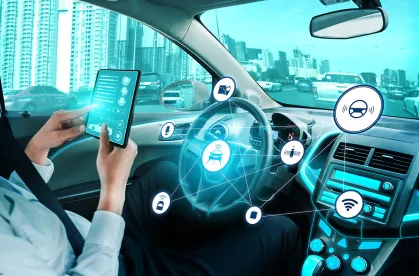Autonomous and connected vehicles, and the data they collect, process and store, create high demands for strong data privacy and security policies. Accordingly, in-house counsel must define holistic data privacy best practices for consumer and B2B autonomous vehicles that balance compliance, safety, consumer protections and opportunities for commercial success against a patchwork of federal and state regulations.
Understanding key best practices related to the collection, use, storage and disposal of data will help in-house counsel frame balanced data privacy policies for autonomous vehicles and consumers. This is the inaugural article in our series on privacy policy best practices related to:
-
Data collection
-
Data privacy
-
Data security
-
Monetizing data
Autonomous and Connected Vehicles: Data Protection and Privacy Issues
The spirit of America is tightly intertwined with the concept of personal liberty, including freedom to jump in a car and go… wherever the road takes you. As the famous song claims, you can “get your kicks on Route 66.” But today you don’t just get your kicks. You also get terabytes of data on where you went, when you left and arrived, how fast you traveled to get there, and more.
Today’s connected and semi-autonomous vehicles are actively collecting 100x more data than a personal smartphone, precipitating a revolution that will drive changes not just to automotive manufacturing, but to our culture, economy, infrastructure, legal and regulatory landscapes.
As our cars are becoming computers, the volume and specificity of data collected continues to grow. The future is now. Or at least, very near. Global management consultant McKinsey estimates “full autonomy with Level 5 technology—operating anytime, anywhere” as soon as the next decade.
This near-term future isn’t only for consumer automobiles and ride-sharing robo taxis. B2B industries, including logistics and delivery, agriculture, mining, waste management and more are pursuing connected and autonomous vehicle deployments.
In-house counsel must balance evolving regulations at the federal and state level, as well as consider cross-border and international regulations for global technologies. In the United States, the Federal Trade Commission (FTC) is the regulatory agency governing data privacy, alongside individual states that are developing their own regulations, with the California Consumer Privacy Act (CCPA) leading the way. Virginia and Colorado have new laws coming into effect in 2022, the California Privacy Rights Act comes into effect in 2023, and a half dozen more states are expected to enact new privacy legislation in the near future.
While federal and state regulations continue to evolve, mobility companies in the consumer and B2B mobility sectors need to make decisions today about their own data privacy and security policies in order to optimize compliance and consumer protection with opportunities for commercial success.
Understanding Types of Connected and Autonomous Vehicles
Autonomous, semi-autonomous, self-driving, connected and networked cars; in this developing category, these descriptions are often used interchangeably in leading business and industry publications. B2B International defines “connected vehicles (CVs) [as those that] use the latest technology to communicate with each other and the world around them” whereas “autonomous vehicles (AVs)… are capable of recognizing their environment via the use of on-board sensors and global positioning systems in order to navigate with little or no human input. Examples of autonomous vehicle technology already in action in many modern cars include self-parking and auto-collision avoidance systems.”
But SAE International and the National Highway Traffic Safety Administration (NHTSA) go further, defining five levels of automation in self-driving cars.
Levels of Driving Automation™ in Self-Driving Cars
Level 3 and above autonomous driving is getting closer to reality every day because of an array of technologies, including: sensors, radar, sonar, lidar, biometrics, artificial intelligence and advanced computing power.
Approaching a Data Privacy Policy for Connected and Autonomous Vehicles
Because the mobility tech ecosystem is so dynamic, many companies, though well intentioned, inadvertently start with insufficient data privacy and security policies for their autonomous vehicle technology. The focus for these early and second stage companies is on bringing a product to market and, when sales accelerate, there is an urgent need to ensure their data privacy policies are comprehensive and compliant.
Whether companies are drafting initial policies or revising existing ones, there are general data principles that can guide policy development across the lifecycle of data:
|
Collect |
Use |
Store |
Dispose |
|---|---|---|---|
|
Only collect the data you need |
Only use data for the reason you informed the consumer |
Ensure reasonable data security protections are in place |
Dispose the data when it’s no longer needed |
Additionally, for many companies, framing autonomous and connected vehicle data protection and privacy issues through a safety lens can help determine the optimal approach to constructing policies that support the goals of the business while satisfying federal and state regulations.
For example, a company that monitors driver alertness (critical for safety in today’s Level 2 AV environment) through biometrics is, by design, collecting data on each driver who uses the car. This scenario clearly supports vehicle and driver safety while at the same time implicates U.S. data privacy law.
In the emerging regulatory landscape, in-house counsel will continue to be challenged to balance safety and privacy. Biometrics will become even more prevalent in connection to identification and authentication, along with other driver-monitoring technologies for all connected and autonomous vehicles, but particularly in relation to commercial fleet deployments.
Developing Best Practices for Data Privacy Policies
In-house counsel at autonomous vehicle companies are responsible for constructing their company’s data privacy and security policies. Best practices should be set around:
-
What data to collect and when
-
How collected data will be used
-
How to store collected data securely
-
Data ownership and monetization
Today, the CCPA sets the standard for rigorous consumer protections related to data ownership and privacy. However, in this evolving space, counsel will need to monitor and adjust their company’s practices and policies to comply with new regulations as they continue to develop in the U.S. and countries around the world.
Keeping best practices related to the collection, use, storage and disposal of data in mind will help in-house counsel construct policies that balance consumer protections with safety and the commercial goals of their organizations.
A parting consideration may be opportunistic, if extralegal: companies that choose to advocate strongly for customer protections may be afforded a powerful, positive opportunity to position themselves as responsible corporate citizens.






 />i
/>i
